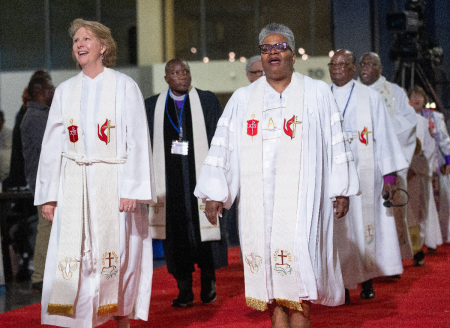UMC benefits org drops 34 church leaders who paid into program after disaffiliation

A United Methodist Church organization dedicated to providing financial support for the families of deceased pastors has dropped over 30 members who have paid into the program because their churches left the denomination.
The Brotherhood/Sisterhood of the UMC Western North Carolina Conference was founded to provide financial assistance to the families of deceased clergy in the regional body. Members pay into the program over time.
However, former UMC clergy like Pastor Talbot Davis of Good Shepherd Church in Charlotte have been severed from the program, even after paying thousands of dollars into the group.
Davis told The Christian Post that he began investing in BH/SH in the 1990s when he was 29. He put approximately $7,000 into the program over the last few decades.
"As a young clergyman in the Western North Carolina Conference of the UMC back in 1990, I heard the presentation from the floor of our Annual Conference gathering about the Brotherhood / Sisterhood and its ability to present a $10,000 check to the surviving family members of any clergy who died," he recounted.
"I wanted to support clergy families during my time in ministry, and then wanted my own surviving family to receive the benefit whenever I die. I was 29 when I made that decision."
Davis' congregation voted nearly unanimously to disaffiliate from the UMC last September. It is one of approximately 7,500 churches to leave the denomination over the past few years due to the ongoing debate over UMC's stance on homosexuality. The congregation is currently nondenominational.
Davis said he received an email last November explaining that he and other clergy whose churches were disaffiliated could still participate in the BH/SH program "and be assured of the death benefit if we so desired."
"I responded with, 'I'm in!' as I believe in the ministry," David told CP.
Davis said he received a new email in May stating that clergy who had joined the Global Methodist Church, a denomination launched as a conservative alternative to the UMC, would not be allowed to participate in the program. While his church did not affiliate with the GMC, he was also removed.
"Finally, the BH/SH executive director admitted in an email that [if] I had joined a liberal, left-leaning denomination such as the PCUSA, the Episcopal Church, or the ELCA, my BH/SH membership likely would not have been removed," Davis said.
Burton Williams, pastor at Christ Church Gastonia, is a former UMC clergyman who had served on the board of the BH/SH program for eight years. He was also removed from the program.
"I joined to be part of a group that wanted to be supportive of spouses and children when a clergy person passed. I think it's important that we care for one another in a tangible way. That was the purpose of the BH/SH as explained to me back in 1997," Williams told CP.
Williams said he "pushed the board to make revisions to allow for those of us departing the UMC to continue as members" because "many of us had decades of membership in the organization and I and others still wanted to provide care for our brother and sister clergy person's families."
"It was a fight to convince them to make this allowance," he recalled. "They finally consented to allow for clergy who joined denominations that were connected to the World Methodist Council to remain. I also pointed out that joining would take time for a new denomination."
Williams said he didn't receive the notice Davis did from the program and has queried the BH/SH for more information.
Williams pointed out that since the GMC has not had its first convening conference or general conference yet, it will not have "as of yet joined the aforementioned Council."
Launched in 2022, the GMC is scheduled for its inaugural general conference on Sept. 20-26 in San Jose, Costa Rica.
CP contacted the UMC WNC Conference for a response. Spokesperson Aimee Yeager clarified that the regional body "has no role in this situation or the decisions that have been or will be made by Brotherhood/Sisterhood."
"Brotherhood/Sisterhood is a completely separate entity that makes its own determinations and decisions. The Western NC Conference was not involved directly or even indirectly with any course of action they adopted. Therefore, we cannot speak to these questions," she added.
Yeager directed CP to contact Roland Barnhardt, the executive director of The BH/SH, who said that to "remain a member of the BH/SH, a clergy person must be a member of the WNCC of the UMC."
Barnhardt said there were 34 members who had withdrawn or disaffiliated from the conference and "ended their membership in the BH/SH as a consequence of their action."
"They removed themselves from the covenant relationship they had entered into with other clergy members of this organization that was formed by clergy and laity working together in 1893," he explained.
Barnhardt did note that the constitution and bylaws of the BH/SH state that "beneficiary membership in the Brotherhood/Sisterhood shall not be forfeited by transfer to a church that is a member of the World Methodist Council or one named by the Pan-Methodist Commission in paragraph 433.1 & 2 of The Book of Discipline of The United Methodist Church."
This was "provided that the member continues to be a clergy member of that church in good standing as outlined in paragraph IX above and continues to pay the assessments."
"The assessments that each member agrees to pay per death of another beneficiary clergy member helps to fund the benefit The BH/SH provides to the surviving spouse or other designated family member or beneficiary of our deceased brothers and sisters," he explained.
"This is our ministry. It is an expression of our affirmation and love for the families of our colleagues. I can only pray for those who think it's all about the benefit their loved ones are entitled to."





















